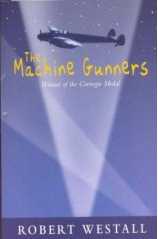The Machine Gunners - Robert Westall

Continuing the on-off theme of WW2 books (a mere accident of library borrowing), I've just read Robert Westall's excellent The Machine Gunners. Chas McGill is in his early teens in 1940 and lives in a small Tyneside town, in the industrial north-east of England, a town which is subjected to terrifying bombing raids by the Germans. Chas has the second-best collection of war souvenirs in town and he's desperate to have the best one. Then one night, a German plane crashes onto the local disused laundry, but its tail ends up in the nearby wood. Chas discovers it and when he sees the machine gun is still in place and intact he just has to have it. Climbing up to see if he can detach it, he gets a shock, however, when he finds the rear-gunner still in his seat, but quite definitely dead. However, he overcomes his horror and persuades his friend Cemetary Jones (the son of the local undertaker) and Audrey, a tomboy who's "as good as a boy", to help recover the machine gun. They hide it away and then soon afterwards comes another dreadful air raid, and Chas decides he's going to use the gun against the invading Germans. He and his friends look for somewhere to position it and they discover the perfect spot, in the garden of Chas' school fellow, Benjamin Nichol, known to everyone as Nicky. They begin building a machine gun emplacement there, despite the house being full of ratings billeted there with Nicky and his mother.
Nicky's home takes a direct hit from a bomb, but he had woken during the night suddenly overwhelmed by the smell of the sea, and he has a premonition that gets him out of the house before the bomb hits it. So the children turn their machine gun spot into a proper fortress, enlisting the help of a local man who is a bit simple but very strong, to do the digging for them. The children are able to spend most of their days at the Fortress, and Nicky and Clogger (another of Chas' friends, who lost his mother and whose father is in the Navy) live their permanently. Then one day, they attempt to shoot down a German aircraft that is sneaking into the harbour. Although they don't hit it, the local gunners do, but Rudi, the rear gunner in the aircraft escapes and eventually finds himself in the custody of the Chas and his friends. Although the children are armed, Rudi is sick and unable to escape them. By the time he recovers, he has become a father figure to them all, especially Nicky and Clogger. He persuades them to find him a boat (Nicky's father's boat) in return for fixing the machine gun, which had been taken apart by one of the boys. He sets during what everyone in Garmouth thinks is the German invasion, leaving the children behind, although Nicky has begged to be allowed to go with him.
This is a fascinating and engaging account of what life was like for a group of children in a seaside town that's being bombed on a regular basis, leaving the adults as helpless as the children, as Chas realises:
Ever since he was little, Dad had meant safety: large, solid, bristly-faced, smelling of tobacco. His thumb always grew in three segments, where he had hit it with a hammer while he was an apprentice.
But could any grown-up keep you safe now? They couldn't stop the German bombers. They hadn't saved Poland, or Norway or France. Or the battleship the German submarine torpedoed in Scapa Flow itself.
Their own air-raid shelter at home - it wasn't as safe as the Fortress. It was only covered with a foot of soil. Couldn't Dad have done better than that?
He looked at his father, and saw a weary, helpless middle-aged man. Dad wasn't any kind of God any more. (p. 95)


No comments:
Post a Comment